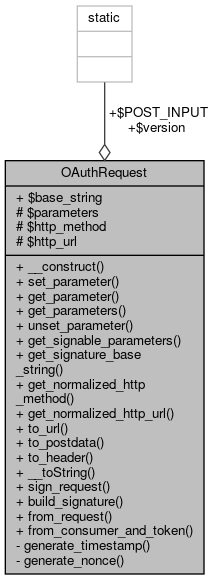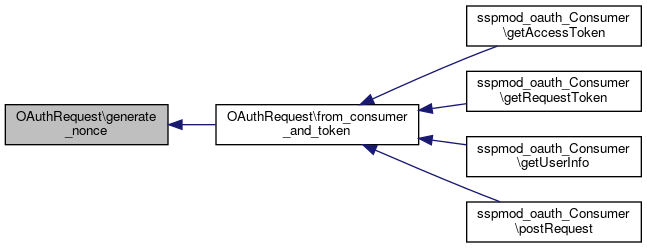 Collaboration diagram for OAuthRequest:
Collaboration diagram for OAuthRequest:Public Member Functions | |
| __construct ($http_method, $http_url, $parameters=null) | |
| set_parameter ($name, $value, $allow_duplicates=true) | |
| get_parameter ($name) | |
| get_parameters () | |
| unset_parameter ($name) | |
| get_signable_parameters () | |
| The request parameters, sorted and concatenated into a normalized string. More... | |
| get_signature_base_string () | |
| Returns the base string of this request. More... | |
| get_normalized_http_method () | |
| just uppercases the http method More... | |
| get_normalized_http_url () | |
| parses the url and rebuilds it to be scheme://host/path More... | |
| to_url () | |
| builds a url usable for a GET request More... | |
| to_postdata () | |
| builds the data one would send in a POST request More... | |
| to_header ($realm=null) | |
| builds the Authorization: header More... | |
| __toString () | |
| sign_request ($signature_method, $consumer, $token) | |
| build_signature ($signature_method, $consumer, $token) | |
Static Public Member Functions | |
| static | from_request ($http_method=null, $http_url=null, $parameters=null) |
| attempt to build up a request from what was passed to the server More... | |
| static | from_consumer_and_token ($consumer, $token, $http_method, $http_url, $parameters=null) |
| pretty much a helper function to set up the request More... | |
Data Fields | |
| $base_string | |
Static Public Attributes | |
| static | $version = '1.0' |
| static | $POST_INPUT = 'php://input' |
Protected Attributes | |
| $parameters | |
| $http_method | |
| $http_url | |
Static Private Member Functions | |
| static | generate_timestamp () |
| util function: current timestamp More... | |
| static | generate_nonce () |
| util function: current nonce More... | |
Detailed Description
Constructor & Destructor Documentation
◆ __construct()
| OAuthRequest::__construct | ( | $http_method, | |
| $http_url, | |||
$parameters = null |
|||
| ) |
Definition at line 280 of file OAuth.php.
References $http_method, $http_url, $parameters, and OAuthUtil\parse_parameters().
 Here is the call graph for this function:
Here is the call graph for this function:Member Function Documentation
◆ __toString()
| OAuthRequest::__toString | ( | ) |
◆ build_signature()
| OAuthRequest::build_signature | ( | $signature_method, | |
| $consumer, | |||
| $token | |||
| ) |
Definition at line 526 of file OAuth.php.
References PHPMailer\PHPMailer\$token.
Referenced by sign_request().
 Here is the caller graph for this function:
Here is the caller graph for this function:◆ from_consumer_and_token()
|
static |
pretty much a helper function to set up the request
Definition at line 346 of file OAuth.php.
References $http_method, $http_url, $parameters, PHPMailer\PHPMailer\$token, $version, generate_nonce(), and generate_timestamp().
Referenced by sspmod_oauth_Consumer\getAccessToken(), sspmod_oauth_Consumer\getRequestToken(), sspmod_oauth_Consumer\getUserInfo(), and sspmod_oauth_Consumer\postRequest().
 Here is the call graph for this function:
Here is the call graph for this function: Here is the caller graph for this function:
Here is the caller graph for this function:◆ from_request()
|
static |
attempt to build up a request from what was passed to the server
Definition at line 293 of file OAuth.php.
References $_SERVER, $http_method, $http_url, $parameters, OAuthUtil\get_headers(), OAuthUtil\parse_parameters(), and OAuthUtil\split_header().
 Here is the call graph for this function:
Here is the call graph for this function:◆ generate_nonce()
|
staticprivate |
util function: current nonce
Definition at line 543 of file OAuth.php.
Referenced by from_consumer_and_token().
 Here is the caller graph for this function:
Here is the caller graph for this function:◆ generate_timestamp()
|
staticprivate |
util function: current timestamp
Definition at line 535 of file OAuth.php.
Referenced by from_consumer_and_token().
 Here is the caller graph for this function:
Here is the caller graph for this function:◆ get_normalized_http_method()
| OAuthRequest::get_normalized_http_method | ( | ) |
just uppercases the http method
Definition at line 433 of file OAuth.php.
Referenced by get_signature_base_string().
 Here is the caller graph for this function:
Here is the caller graph for this function:◆ get_normalized_http_url()
| OAuthRequest::get_normalized_http_url | ( | ) |
parses the url and rebuilds it to be scheme://host/path
Definition at line 442 of file OAuth.php.
References $path.
Referenced by get_signature_base_string(), and to_url().
 Here is the caller graph for this function:
Here is the caller graph for this function:◆ get_parameter()
| OAuthRequest::get_parameter | ( | $name | ) |
◆ get_parameters()
| OAuthRequest::get_parameters | ( | ) |
Definition at line 382 of file OAuth.php.
References $parameters.
◆ get_signable_parameters()
| OAuthRequest::get_signable_parameters | ( | ) |
The request parameters, sorted and concatenated into a normalized string.
- Returns
- string
Definition at line 396 of file OAuth.php.
References $parameters, PHPMailer\PHPMailer\$params, and OAuthUtil\build_http_query().
Referenced by get_signature_base_string().
 Here is the call graph for this function:
Here is the call graph for this function: Here is the caller graph for this function:
Here is the caller graph for this function:◆ get_signature_base_string()
| OAuthRequest::get_signature_base_string | ( | ) |
Returns the base string of this request.
The base string defined as the method, the url and the parameters (normalized), each urlencoded and the concated with &.
Definition at line 417 of file OAuth.php.
References get_normalized_http_method(), get_normalized_http_url(), get_signable_parameters(), and OAuthUtil\urlencode_rfc3986().
 Here is the call graph for this function:
Here is the call graph for this function:◆ set_parameter()
| OAuthRequest::set_parameter | ( | $name, | |
| $value, | |||
$allow_duplicates = true |
|||
| ) |
Definition at line 361 of file OAuth.php.
References $name.
Referenced by sign_request().
 Here is the caller graph for this function:
Here is the caller graph for this function:◆ sign_request()
| OAuthRequest::sign_request | ( | $signature_method, | |
| $consumer, | |||
| $token | |||
| ) |
Definition at line 515 of file OAuth.php.
References PHPMailer\PHPMailer\$token, build_signature(), and set_parameter().
 Here is the call graph for this function:
Here is the call graph for this function:◆ to_header()
| OAuthRequest::to_header | ( | $realm = null | ) |
builds the Authorization: header
Definition at line 482 of file OAuth.php.
References $out, and OAuthUtil\urlencode_rfc3986().
 Here is the call graph for this function:
Here is the call graph for this function:◆ to_postdata()
| OAuthRequest::to_postdata | ( | ) |
builds the data one would send in a POST request
Definition at line 474 of file OAuth.php.
References OAuthUtil\build_http_query().
Referenced by to_url().
 Here is the call graph for this function:
Here is the call graph for this function: Here is the caller graph for this function:
Here is the caller graph for this function:◆ to_url()
| OAuthRequest::to_url | ( | ) |
builds a url usable for a GET request
Definition at line 461 of file OAuth.php.
References $out, get_normalized_http_url(), and to_postdata().
Referenced by __toString().
 Here is the call graph for this function:
Here is the call graph for this function: Here is the caller graph for this function:
Here is the caller graph for this function:◆ unset_parameter()
| OAuthRequest::unset_parameter | ( | $name | ) |
Field Documentation
◆ $base_string
◆ $http_method
|
protected |
Definition at line 273 of file OAuth.php.
Referenced by __construct(), from_consumer_and_token(), and from_request().
◆ $http_url
|
protected |
Definition at line 274 of file OAuth.php.
Referenced by __construct(), from_consumer_and_token(), and from_request().
◆ $parameters
|
protected |
Definition at line 272 of file OAuth.php.
Referenced by __construct(), from_consumer_and_token(), from_request(), get_parameters(), and get_signable_parameters().
◆ $POST_INPUT
◆ $version
|
static |
Definition at line 277 of file OAuth.php.
Referenced by from_consumer_and_token().
The documentation for this class was generated from the following file:
- libs/composer/vendor/simplesamlphp/simplesamlphp/modules/oauth/libextinc/OAuth.php





















